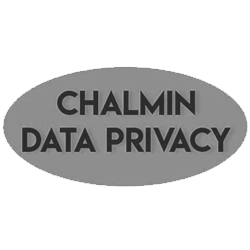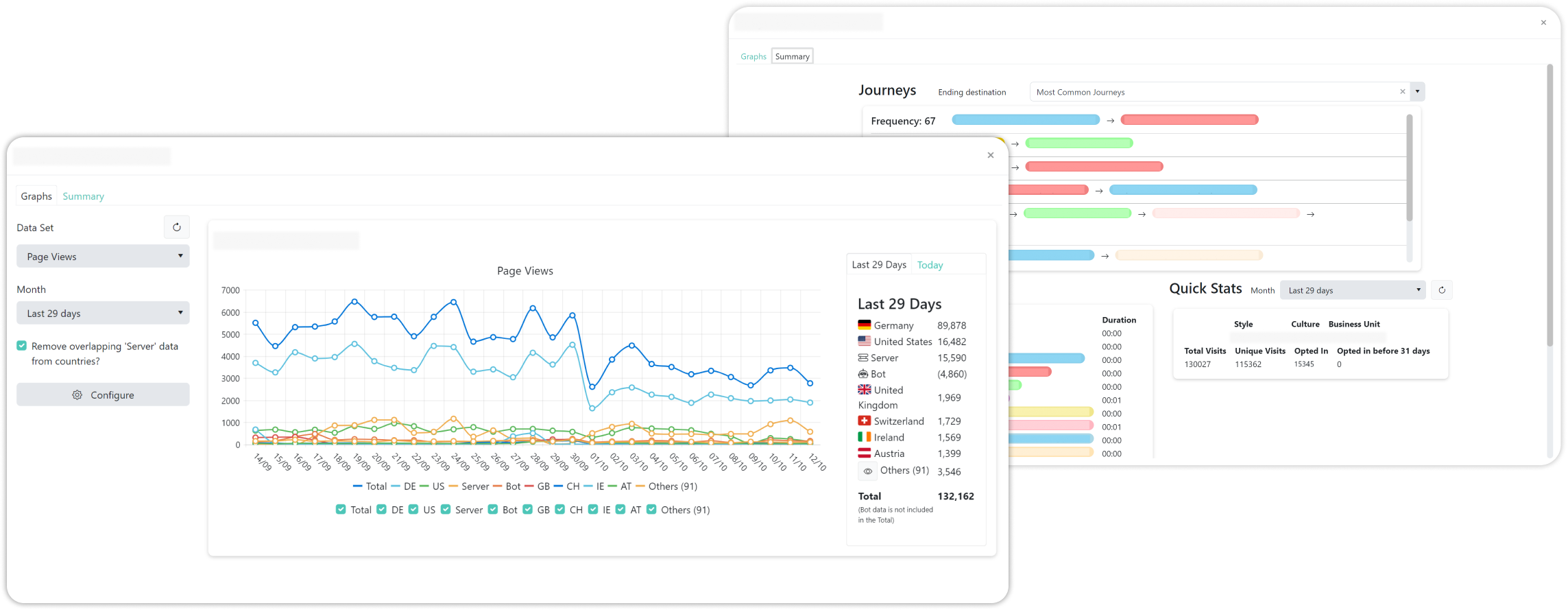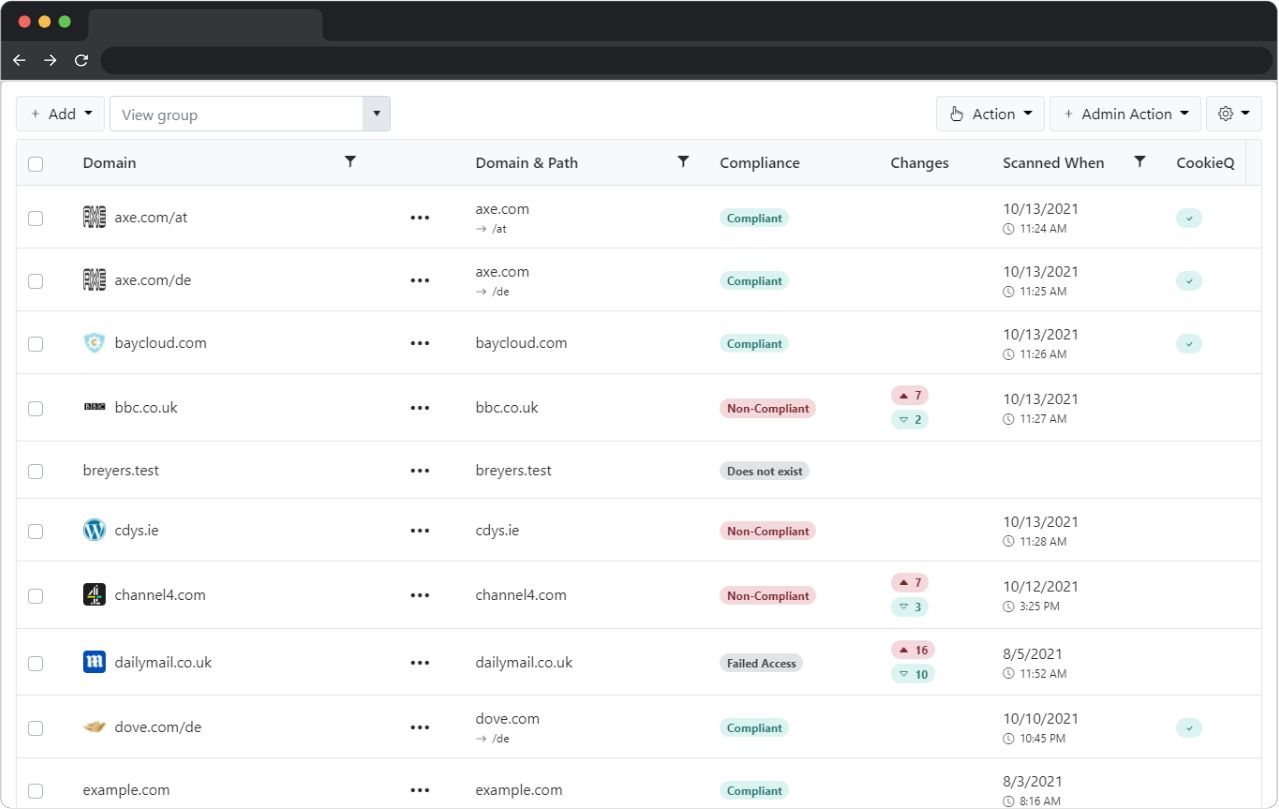Full-service implementation from the recognised specialists
Experts in:
Data Privacy and Security
|
We have the expertise and tools to get you fully compliant today
Email us to find out more
Verifiable compliance from the original consent platform
Integrated cookieless & tracking-free analytics
Rich Consent API, tried & tested for over a decade
Google Consent Mode V2 built-in, no need for GTM
Bullet-proof security, eradicate malware & unauthorised disclosure
Automatic consent enabling of YouTube etc.
Detailed website cookie scanning, with example categorisations
- In the US - comply with data sharing opt-out laws including respect for GPC in the CCPA's preferred "frictionless" manner
- In Europe - avoid the use of non-exempt cookies or browser storage without user consent
- Stop
the unauthorised disclosure of personal data and users' exposure to malware
- Our proven security & consent platform will enforce your rules & protect your reputation
- Don't get caught out with fines or class action!
The only consent management & security system designed from the start for authenticity & transparency combining corporate-level manageabiity & control with cookieless & tracking-free web analytics - continuously in use by major companies since 2011, & now internationally available to any size organisation.
Deliver real CCPA & other state & federal law compliance through effective control over tracking including automatic opt-out response to the GPC or DNT signals, ensuring no third-party tracking or sale of personal data without valid user consent.
Trusted by multinationals and household brands
Our designed-for-compliance consent management solution was the first to market, and has fully protected sites and their visitors since 2011.




























Build customer trust with the industry leading cookie compliance platform
Get the platform our competitors don't want you to know about that does the job better, while charging less.
What differentiates us from run-of-the-mill pop-ups
Show you respect your customers' privacy and data with ConsentHub's advanced technology, purpose designed for authentic safety-first compliance.
Read more ...As security technologist Bruce Schneier has pointed out, personal data, sent to others or retained without proper safeguards, can be a toxic asset. It can create massive costs to companies from regulatory and civil action, or result in reduced sales through reputation damage and loss of customer trust. The last 6 months has seen GDPR fines more than double the total of $1.64 billion collected up January 28 2022, and this is accelerating.
The biggest such threat to online shops arises from data exposed to data exploitation by uncontrolled tracking.
The answer is not to pay out for expensive and over-inflated breach mitigation systems but rather to ignore calls for unnecessary data collection and "free" third-party web services, when the only benefit could be having a few inappropriately-placed ads solely seen by ad-fraud bots while leaving potential customers irritated or worse, repelled
ConsentHub was designed to address these issues head-on.
We start you off with a clean slate, blocking everything so that only content you have designed or approve of, and cookies given valid informed consent or strictly necessary to fulfill a request, are allowed on your site. This not only ensures you are are fulfilling the legal requirements arising from the GDPR, ePrivacy, CRPA etc., but also that you and your customers are protected from data-theft and "malware".
Fully customizable panel & button
Create your own consent platform user interface's look & feel or go with our default user interface built to optimize engagement. All changes can be edited by you and appear immediately without having to republish the site.
Automatic real-time & accurate website cookie scanning
Automatic recurrent scanning detects all cookies and browser-based storage whatever its source. Get prompted when changes are detected such as new cookie-using apps being installed, or whenever the configuration needs updating. Real-time indication when potentially damaging "malware" or unrecognised content is found and automatically blocked.
Built for scale
Monitor and manage thousands of merchant sites from the same account, see the latest scan information, instantly generate real-time and static reports.
Anonymous analytics
Without cookies, instantly see how many visits a site gets, the proportion of visitors opting-in, what country they are from, the most common referring sites etc.
Got a website you'd like to scan?
Cookieless tracking-free analytics.
We understand the importance of analytics systems to our clients, and we have developed and tested ours in consultation with major B2C companies.
Our analytics system does not use cookies (unless users agree) so can collect aggregated data across all visitors to deliver accurate metrics such as opt-in/opt-out rates, page views & referrals.
Percentage of browsers worldwide we have detected with DNT ("Do Not Track") set: 0.00%
0.00% of browsers have either DNT or GPC set
0.00% of browsers have only DNT set
DNT means "Do Not Track"0.00% of browsers have GPC set
0.00% of browsers have only GPC set
GPC means "Global Privacy Control"

Baycloud’s new Dashboard.
Monitoring, auditing, management and customization, all in one place. Maintain a constant awareness of your company's compliance status across all of its domains.
Now you can set up our compliance pop up, run daily privacy audits, generate cookie policies for your websites and monitor your compliance status and site analytics using our easily navigable new control centre. The dashboard is compatible with business communication platforms including Slack and Microsoft teams, and is fully scalable. It is useful for clients that manage any number of websites, from SMEs with one site, to multinationals that operate across thousands of domains.
Currently supported languages
The Baycloud ConsentHub consent panel is supported in the following languages:
The language selected can be pre-configured for a site, or otherwise is automatically determined from the user's browser settings.
If we do not support your language, feel free to contact us.
- Bulgarian
- Croatian
- Czech
- Danish
- Dutch
- English
- Finnish
- French
- German
- Greek
- Hungarian
- Icelandic
- Italian
- Latvian
- Lithuanian
- Norwegian Bokmål
- Norwegian Nynorsk
- Polish
- Portuguese
- Romanian
- Russian
- Serbian
- Slovak
- Spanish
- Swedish
- Ukrainian
